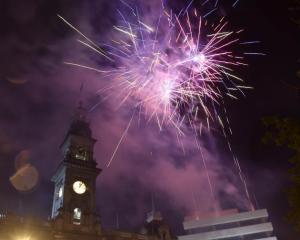He attended Richmond Road School in Ponsonby, and Sacred Heart College in Glen Innes.
He graduated from Auckland University with a bachelor of laws degree in 1970 and worked at the Crown Solicitor's Office in Auckland, before being appointed a District Court judge in 1982.
He sat in Palmerston North, then various Auckland courts, before being appointed a Parliamentary Ombudsman in 1994, serving two five-year terms, before being elevated to one of the country's highest offices in 2006.
He was made a distinguished companion of the New Zealand Order of Merit in 2006 and subsequently redesignated a Knight Grand Companion of the New Zealand Order of Merit - "Sir" to you and me.
Subject B was also born in Auckland, in 1960.
In 1971, at the age of 11, he moved with his mother to Bristol, in the United Kingdom, where he completed his education and won a drama school scholarship.
He began a career in broadcasting working for the BBC before eventually returning to New Zealand.
He was employed by a number of radio stations before setting up his own in 1991.
He moved on to numerous other roles on Radio Pacific and Radio Live and ran unsuccessfully as a National Party candidate in the 1999 Wairarapa electorate, won by transsexual Labour MP Georgina Beyer.
He now hosts a high-profile national breakfast television show and has won notoriety for several incidents in which he has belittled public figures.
On the above evidence - admittedly not complete - which of our subjects is more entitled to consider himself a real "New Zealander"? Neither, is the correct answer, for they are both equally entitled to call themselves Kiwis.
But if one had to choose, if one had to weigh up competing claims, it might be thought Subject A could have the edge.
On what basis?
Longevity, for starters: he's lived here longer.
Uninterrupted residence? Public service? Contribution to society?
It's an academic exercise, but not according to Subject B, who this week clearly insinuated in the presence of the Prime Minister, John Key, that Subject A's credentials as a New Zealander were questionable.
On Monday morning, on state broadcaster TV One's Breakfast programme, host Paul Henry Hopes, more commonly known as Paul Henry, asked Mr Key of Governor-General Sir Anand Satyanand, "Is he even a New Zealander?"
Mr Henry, revealing the underlying thrust of his question, continued: "Are you going to choose a New Zealander [as Governor-General] who looks and sounds like a New Zealander this time ... Are we going to go for someone who is more like a New Zealander this time?"
For Paul Henry, the colour of Sir Anand Satyanand's skin, his ethnicity and voice inflections, single him out as not a real New Zealander.
It is hard to describe this as anything other than racism.
And into this matey, blokes-like-us conspiracy of insinuation, Mr Henry invited Mr Key.
Not normally short of a word, nor presence of mind, on the occasion Mr Key's deserted him and it was not until later in the day that he saw fit to contradict or condemn his erstwhile host.
Mr Henry subsequently issued the standard meaningless and unfelt apology for any "offence caused", then again, as the fallout began to settle in, more sincerely - apparently.
Belatedly, yesterday, a day after the event and having at first tried to defend its broadcaster's actions, TVNZ suspended Mr Henry without pay until October 18 - a period of a little less than two weeks.
Mr Henry has many skills as a broadcaster.
He is intelligent, sharp, with a distinctive and playful wit.
He is, for instance, especially good at shafting the shibboleths of humourless political correctness: that which should not be spoken, he takes a certain pride in speaking.
That is fine, as far as it goes, welcome even, and refreshing.
But Mr Henry would also enlist us all - using as his platform the offices of the "public broadcaster", TV One - into his particular world view, political, cultural, social.
Beneath the jokey mien runs a vein of mean-spirited prejudice: whether it is facial hair on female studio guests, the "retarded" appearance of Susan Boyle, the unnaturalness of homosexuals, or expressing the view that to be a real New Zealander you have to be white-skinned, like himself and Mr Key, and talk just like it.
Behind it all seems to be the idea that "difference" is to be singled out and mocked.
And after the mockery ..? What then?
The calumnies of history tell us that is a dangerous path to traverse.
Initially, a TVNZ spokesman defended Mr Henry on the basis the audience consistently says they like the host precisely because "he's prepared to say things we quietly think but are scared to say out loud".
This is as indefensible as Mr Henry's original remarks.
First, that the public broadcaster apparently sees fit to ascribe to all New Zealanders complicity in Mr Henry's racist sentiments is insulting and offensive; second, it shows yet again that ultimately TV One aspires to no higher standards than those of a ratings-craving populism - a brand of broadcasting inexorably bound for the gutter.
Simon Cunliffe is assistant editor at the Otago Daily Times










